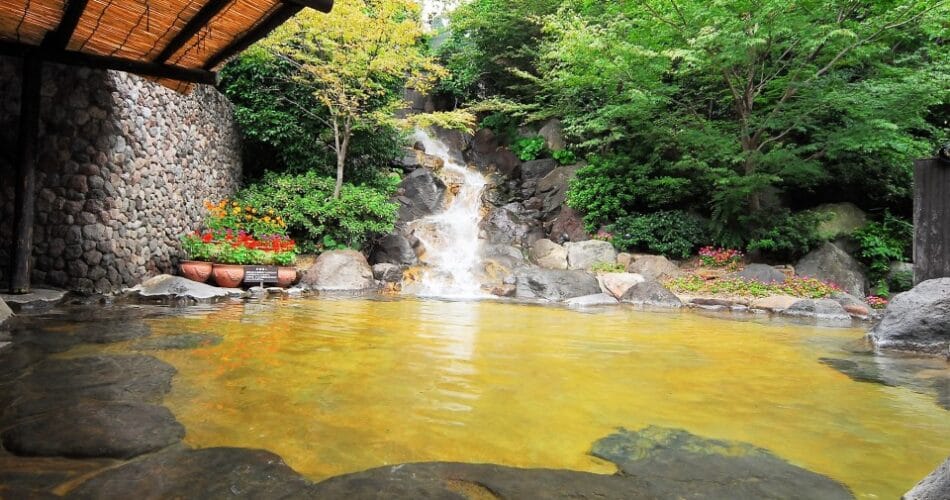Are you visiting Japan soon and dreaming of a long soak in natural hot springs, but worried your tattoos will get you turned away? You are not alone. Many travelers have the same concern, because some bathhouses still associate tattoos with the yakuza and keep strict rules. The good news is that there are tattoo friendly onsens across the country where you can relax with no cover-up stickers and no awkward conversations at the front desk. This guide is written for tattooed visitors who want clear, practical information and a calm, welcoming experience.
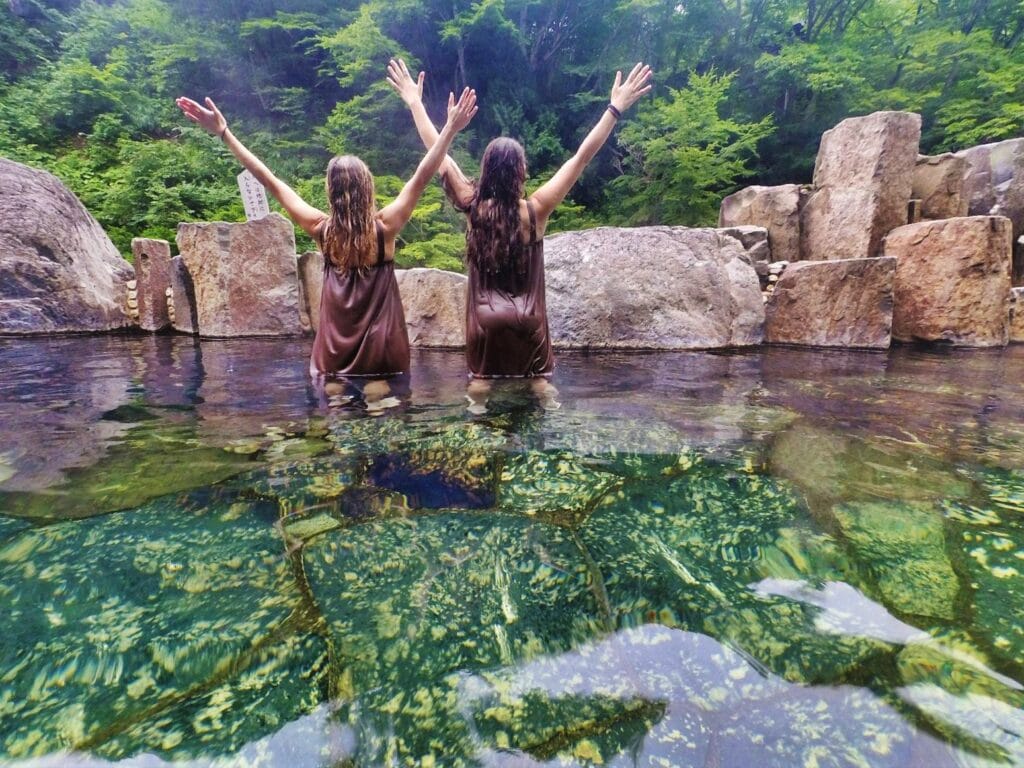
Why onsens are special in Japan
Onsens are natural hot springs rich in minerals like sulfur, sodium chloride, and carbonate. People have soaked in them for centuries to ease sore muscles, improve circulation, and reset the mind. Part of the magic is the ritual: you rinse off, step into warm outdoor pools (rotenburo) or indoor baths, breathe mountain or sea air, and let your body slow down. Even one visit can help with jet lag, tight shoulders, and stress.
How to bathe (quick etiquette refresher)
Shower and soap first, enter the water clean, tie up long hair, and keep towels out of the pool. Onsens are quiet spaces; phones stay in lockers. Most are gender-separated, though a few have mixed outdoor areas or private family baths you can rent by the hour. If you have visible ink, a sleeve, or even a dragon tattoo, pick the tattoo-friendly onsens in this guide and you can soak without stickers. At more traditional baths, ask at the desk, cover small designs if requested, or reserve a private kashikiri tub so your art and everyone’s comfort are respected.
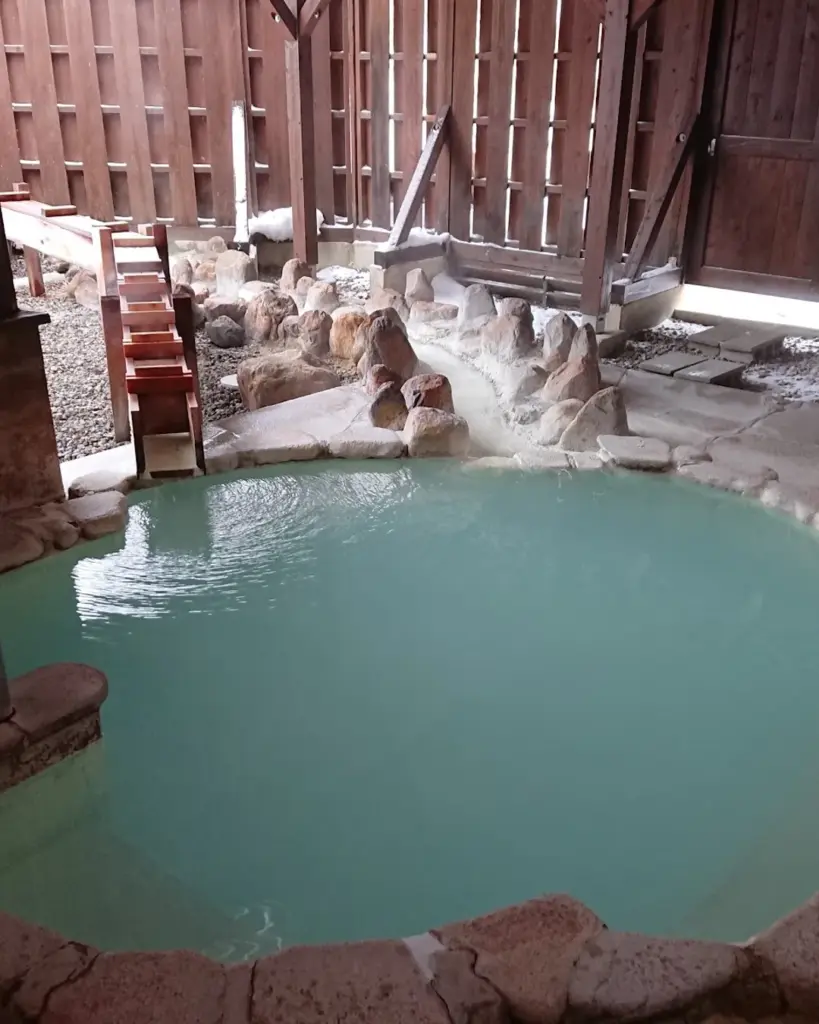
The Top 10 Tattoo Friendly Onsens (no cover required)
Below are welcoming, well-loved tattoo friendly onsens across Japan. Policies can change, so always double-check hours and details the day you go. Prices listed are typical adult day-use ranges and may vary by season.
1) Hoheikyo Onsen — Sapporo, Hokkaidō
Price: about ¥1,000–¥1,500 for day use; optional meal sets extra
Why it is tattoo friendly: The facility openly welcomes tattooed guests without size limits or stickers.
Setting & vibe: A classic northern hot spring with big outdoor pools surrounded by trees and snowy views in winter. Steam rises into cold air, which makes the soak even better.
Gender/coed: Separate men’s and women’s areas; private rental rooms are sometimes available.
What makes it memorable: The on-site restaurant serves legendary Indian curry, perfect after a long soak. If you visit in winter, the contrast of hot water and crisp air is unforgettable.
2) Takaragawa Onsen Osenkaku — Minakami, Gunma
Price: day visit around ¥2,000; overnight ryokan stays available
Why it is tattoo friendly: Long known for welcoming international guests, including those with visible tattoos.
Setting & vibe: A riverside onsen with huge rock pools against forested mountains. The scene looks like a movie set in every season.
Gender/coed: Large outdoor pools include a mixed area with modesty cloths (standard at the site), plus gender-separate baths.
What makes it memorable: Soaking under a light snowfall or listening to the river in spring makes time disappear. It is one of Japan’s most photogenic tattoo friendly onsens.
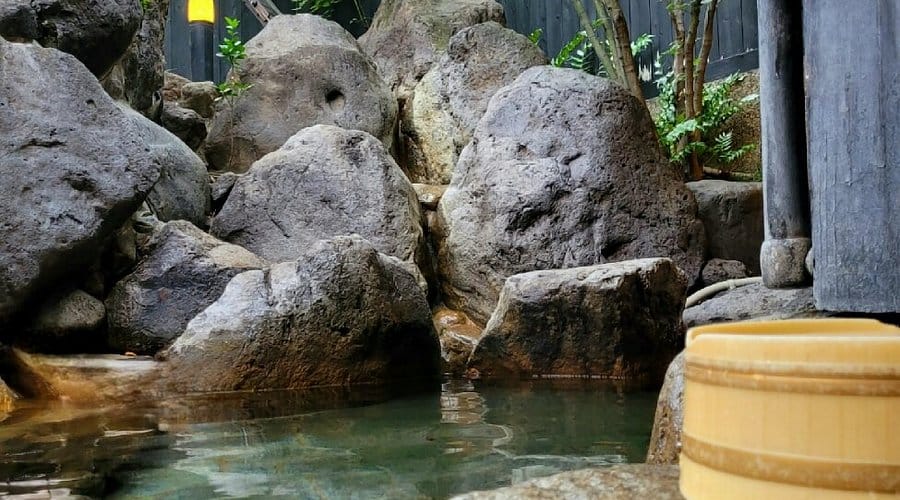
3) Hyōtan Onsen — Beppu, Ōita (Kyūshū)
Price: about ¥800–¥1,200 for baths; add-ons for sand or steam baths
Why it is tattoo friendly: Clear, open policy for tattooed bathers; no cover required.
Setting & vibe: A classic Beppu complex with big indoor/outdoor areas, family baths you can rent, sand baths, and steam rooms.
Gender/coed: Gender-separate public baths plus private family baths (kashikiri) for groups or shy first-timers.
What makes it memorable: Try the sand bath, then rinse off and hop into a rotenburo. Hyōtan is an easy first stop if you want a welcoming onsen in a major hot spring city.
4) Hottarakashi Onsen — Yamanashi (near Kōfu)
Price: about ¥900–¥1,100 depending on time of day
Why it is tattoo friendly: Travelers with visible tattoos are regularly accepted without stickers.
Setting & vibe: Two outdoor areas on a hillside facing Mount Fuji. One pool opens before sunrise; many locals come early, soak, and watch the sky turn pink.
Gender/coed: Separate baths for men and women.
What makes it memorable: On a clear morning, Fuji floats above the clouds. Bring a small towel and plan a simple breakfast after your soak; the snack bar sells hot treats and eggs over rice.
5) Spa World — Osaka (Shinsekai)
Price: dynamic, often ¥1,500–¥2,700 for day entry; night deals exist
Why it is tattoo friendly: This giant “onsen theme park” allows tattoos and attracts visitors from all over the world.
Setting & vibe: Massive multi-floor complex with European- and Asian-themed baths, saunas, and relaxation rooms.
Gender/coed: Main areas are gender-separate; coed zones include pools with swimsuits.
What makes it memorable: You can sample many bath styles in one visit, then eat nearby in lively Shinsekai. It is an urban, easy-access pick among tattoo friendly onsens.
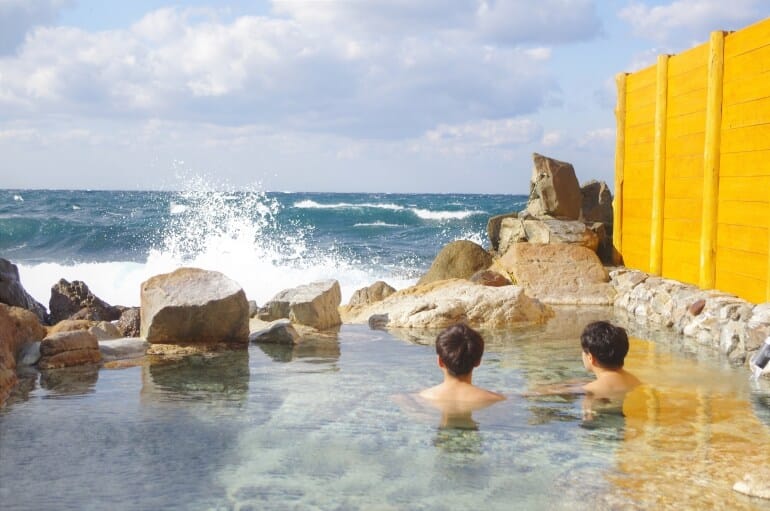
6) Saki-no-Yu — Shirahama, Wakayama
Price: about ¥500–¥1,000 for day use
Why it is tattoo friendly: Long-running seaside bath that welcomes tattooed guests.
Setting & vibe: Outdoor pools carved into rocks with the Pacific crashing just below. On windy days the sea mist drifts across the water.
Gender/coed: Separate men’s and women’s areas.
What makes it memorable: Sunset soaks are unreal. Combine with a walk on Shirarahama Beach and fresh seafood for a perfect coastal day.
7) Kawayu Onsen (Sennin-burō, winter river bath) — Wakayama
Price: often free or a small local fee for the winter pool; check on site
Why it is tattoo friendly: This is a public riverside hot spring; tattoos are not an issue.
Setting & vibe: In winter, locals dig a giant pool in the riverbed and channel hot spring water into it. Steam rises off the water while the river flows beside you.
Gender/coed: Mixed outdoor soak; bring a swimsuit and towels (local rules vary).
What makes it memorable: You are literally soaking in a river of hot spring water. It feels spontaneous and community-made, and it is one of the most relaxed tattoo friendly onsens experiences in Japan.
8) Tsurunoyu — Nyūtō Onsen, Akita
Price: around ¥700–¥1,000 for day baths; ryokan stays popular
Why it is tattoo friendly: Traditional mountain inn known to accept tattooed guests without fuss.
Setting & vibe: Rustic thatched buildings, milky white sulfur springs, and snowy forests in winter.
Gender/coed: Multiple baths, including a famous mixed outdoor pool plus gender-separate areas.
What makes it memorable: You feel like you have slipped into an older Japan. The mineral smell, the white water, and the quiet valley make this a bucket-list stop.
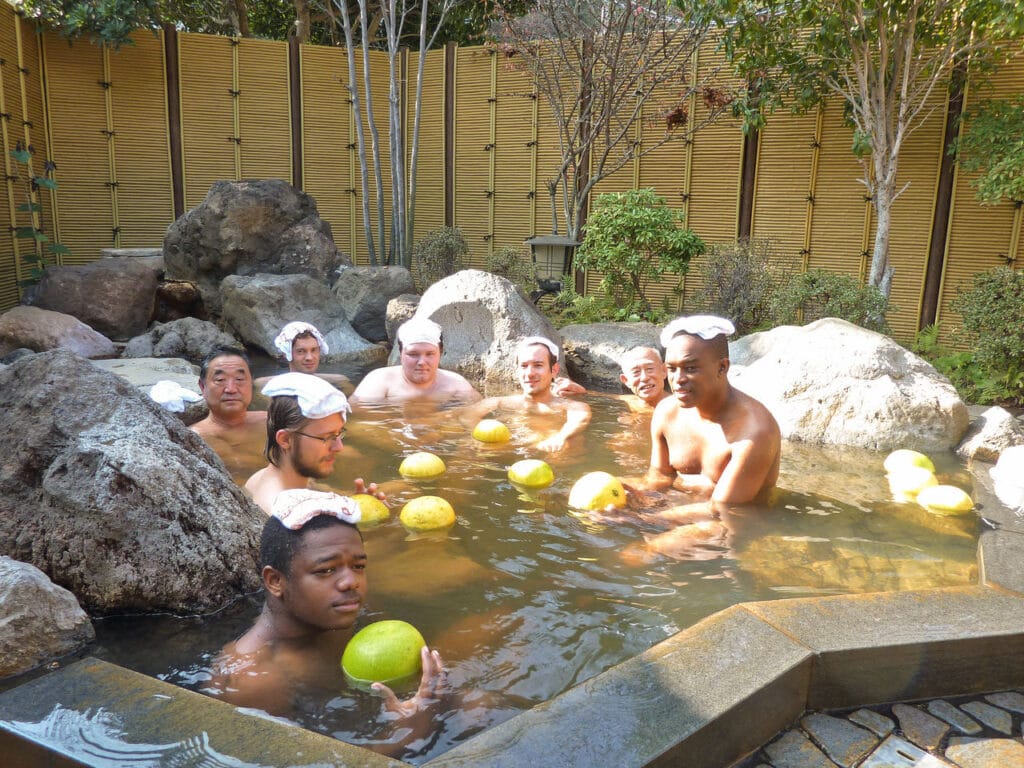
9) Takegawara Onsen — Beppu, Ōita
Price: public bath around ¥300–¥500; sand bath extra (often ¥1,000–¥1,500)
Why it is tattoo friendly: As a municipal bath, it is accustomed to locals and travelers with tattoos.
Setting & vibe: A historic wooden building in central Beppu with a no-frills public bath and famous sand bath.
Gender/coed: Gender-separate baths; sand bath is supervised with simple garments.
What makes it memorable: The sand bath is a fun, old-school experience. Pair this with Hyōtan for a full Beppu day of tattoo friendly onsens.
10) Yufuin Shitanyu (Public Bath) — Yufuin, Ōita
Price: usually ¥200–¥400 for simple public baths in the area
Why it is tattoo friendly: Local public baths in Yufuin typically welcome tattoos and see many repeat visitors.
Setting & vibe: Small, steamy rooms with mineral water and views of Mount Yufu around town.
Gender/coed: Mostly gender-separate public baths; a few inns offer private rental tubs.
What makes it memorable: Yufuin blends art galleries, cafés, and countryside views. A slow wander plus a simple soak makes a gentle day away from big cities.
Where to find more tattoo friendly onsens by region
You do not have to visit only one bath. If you plan a longer trip, aim for areas with several options so you can soak more than once without worrying about cover-ups.
Kyūshū: Beppu and Yufuin (Ōita)
Kyūshū is a hot spring paradise, and Ōita Prefecture is the heart of it. Beppu alone has dozens of facilities, including multiple tattoo friendly onsens with family baths you can reserve for privacy. Yufuin offers smaller public baths and stylish cafés between soaks. If you want the highest density of choices, Kyūshū is hard to beat.
Kansai: Wakayama and Osaka
Shirahama’s Saki-no-Yu and the winter river bath at Kawayu make Wakayama a coastal favorite, while Osaka’s Spa World is the most effortless big-city pick. With trains linking everything, you can base in Osaka and day-trip to the sea or the mountains, soaking at tattoo friendly onsens two days in a row.
Kantō & Chūbu: Gunma and Yamanashi
Gunma’s mountain valleys hide riverside classics like Takaragawa. Yamanashi’s Hottarakashi gives you the Fuji view with an early-morning start. Both prefectures are reachable from Tokyo in a few hours by train or bus, which makes them ideal for first-timers who want tattoo friendly onsens near the capital.
Tōhoku: Akita’s Nyūtō Onsen
Tsurunoyu and neighboring inns deliver the storybook “mountain lodge and milky baths” experience. It is quieter than major tourist hubs, and the staff are used to travelers from around the world enjoying the water without stickers or cover. If a deep winter soak calls to you, head north.
Hokkaidō: Sapporo day trips
Hoheikyo near Sapporo is easy to fold into a city visit. If you are skiing, many resort towns in Hokkaidō are relaxed about tattoos, especially at small public baths and hotel day-use facilities. That means more tattoo friendly onsens after a day on the slopes.
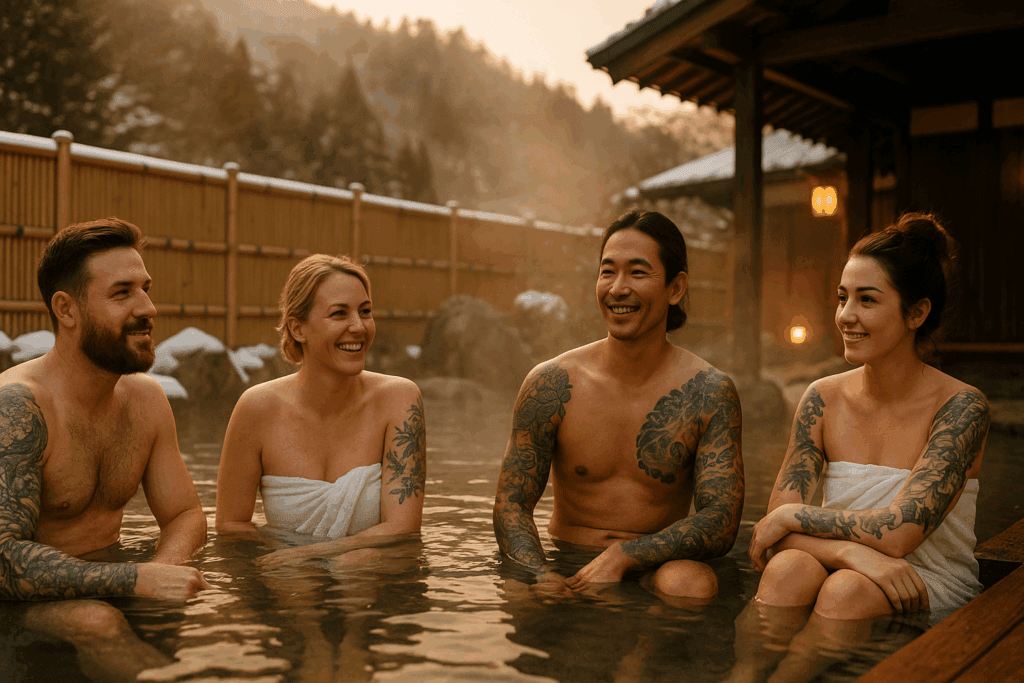
Why do some baths still say “no tattoos”
Understanding the “why” helps you plan with respect. For decades, many Japanese businesses linked tattoos to organized crime. Even today, older guests may feel uneasy. Some operators worry that one unhappy local could complain to the town office or leave bad reviews. Others simply follow old rules because changing signs and retraining staff takes time.
Things are shifting. Tourism has grown fast, younger bath owners are taking over, and more public facilities want to welcome everyone. You will still see “no tattoos” signs, but there are more tattoo friendly onsens every year, especially in places that rely on visitors.
How to choose the right onsen (and avoid stress)
- Look for clear policies. Check the official website or call. If the site is vague, day-use spots in tourist towns are usually more relaxed.
- Aim for day baths first. Public bathhouses and large complexes tend to be straightforward.
- Consider a private family bath. If you want extra comfort, many facilities offer kashikiri tubs by the hour.
- Pick the right time. Mornings and late evenings are quieter. You will have more space to enjoy the water.
- Travel light. Bring a small towel, water bottle, and coins for lockers. Most places rent towels if you forget.
- Be a model guest. Rinse well, keep your towel out of the water, speak softly, and leave your phone in the locker. Good manners go a long way.
Sample 7-day route for tattooed bathers
- Days 1–2: Osaka base. Spa World plus a day trip to Shirahama’s Saki-no-Yu.
- Days 3–4: Beppu. Hyōtan Onsen and Takegawara sand bath.
- Day 5: Yufuin. Public bath and café stroll followed by a Pachinko Parlor.
- Day 6: Gunma. Takaragawa’s riverside pools followed by a night at a Japanese Love Hotel.
- Day 7: Yamanashi. Sunrise soak at Hottarakashi, Fuji views, head back to Tokyo.
This route hits multiple tattoo friendly onsens and gives you city food, seaside sunsets, and mountain air in one trip.
Quick answers to common questions
Do I need to cover my tattoos?
Not at the places listed here. These are tattoo friendly onsens where cover stickers are not required. If staff ever seem unsure, smile, show you already showered, and ask politely. In rare cases, they may suggest a private bath if it is very crowded.
Can I wear a swimsuit?
Usually no in indoor or standard outdoor onsen areas; swimsuits are allowed only in coed zones marked for swimwear, like some areas at Spa World or at public river baths such as Kawayu in winter.
What if I feel stared at?
It happens sometimes. Keep calm, follow etiquette, and enjoy your soak. Most people mind their own business after a minute or two.
Is there a best season?
Winter and early spring are wonderful for steaming outdoor pools. Summer evenings are peaceful in the mountains. Fuji views at Hottarakashi are best on crisp, clear mornings.
Japan’s bathing culture is welcoming when you choose the right places. With this list of tattoo friendly onsens, you can plan a trip that feels easy and respectful from the start. Soak under snow in Nyūtō, watch the Pacific roll by in Shirahama, sip curry after a Sapporo bath, or greet Fuji at dawn in Yamanashi. Let the minerals do their work, and step back into your trip loose, warm, and happy.
If you discover another great spot that welcomes tattoos, share it with fellow travelers. The more we support tattoo friendly onsens, the more doors open for everyone.
